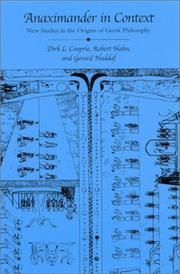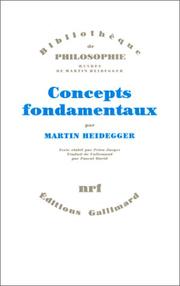| Listing 1 - 10 of 23 | << page >> |
Sort by
|
Book
ISBN: 9781472507792 9781472508928 9781472506252 1472506251 1472507797 1472508920 9781472593146 1472593146 Year: 2016 Publisher: London
Abstract | Keywords | Export | Availability | Bookmark
 Loading...
Loading...Choose an application
- Reference Manager
- EndNote
- RefWorks (Direct export to RefWorks)
"Anaximander, the sixth-century BCE philosopher of Miletus, is often credited as being the instigator of both science and philosophy. The first recorded philosopher to posit the idea of the boundless cosmos, he was also the first to attempt to explain the origins of the world and humankind in rational terms. Anaximander's philosophy encompasses theories of justice, cosmogony, geometry, cosmology, zoology and meteorology. Anaximander: A Re-assessment draws together these wide-ranging threads into a single, coherent picture of the man, his worldview and his legacy to the history of thought. Arguing that Anaximander's statements are both apodeictic and based on observation of the world around him, Andrew Gregory examines how Anaximander's theories can all be construed in such a way that they are consistent with and supportive of each other. This includes the tenet that the philosophical elements of Anaximander's thought (his account of the apeiron, the extant fragment) can be harmonised to support his views on the natural world. The work further explores how these theories relate to early Greek thought and in particular conceptions of theogony and meterology in Hesiod and Homer."-- Anaximander, the sixth-century BCE philosopher of Miletus, is often credited as being the instigator of both science and philosophy. The first recorded philosopher to posit the idea of the boundless cosmos, he was also the first to attempt to explain the origins of the world and humankind in rational terms. Anaximander's philosophy encompasses theories of justice, cosmogony, geometry, cosmology, zoology and meteorology. Anaximander: A Re-assessment draws together these wide-ranging threads into a single, coherent picture of the man, his worldview and his legacy to the history of thought. Arguing that Anaximander's statements are both apodeictic and based on observation of the world around him, Andrew Gregory examines how Anaximander's theories can all be construed in such a way that they are consistent with and supportive of each other. This includes the tenet that the philosophical elements of Anaximander's thought (his account of the apeiron, the extant fragment) can be harmonised to support his views on the natural world. The work further explores how these theories relate to early Greek thought and in particular conceptions of theogony and meterology in Hesiod and Homer
Multi
ISBN: 905166107X Year: 1989 Publisher: Delft : Eburon,
Abstract | Keywords | Export | Availability | Bookmark
 Loading...
Loading...Choose an application
- Reference Manager
- EndNote
- RefWorks (Direct export to RefWorks)
1 <38> ANAXIMANDER --- Griekse filosofie--ANAXIMANDER --- #A9206W --- Theses --- 1 <38> ANAXIMANDER Griekse filosofie--ANAXIMANDER
Book
ISBN: 3416020294 Year: 1988 Publisher: Bonn Bouvier
Abstract | Keywords | Export | Availability | Bookmark
 Loading...
Loading...Choose an application
- Reference Manager
- EndNote
- RefWorks (Direct export to RefWorks)
Book
ISBN: 2130437850 9782130437857 Year: 1991 Publisher: Paris: PUF,
Abstract | Keywords | Export | Availability | Bookmark
 Loading...
Loading...Choose an application
- Reference Manager
- EndNote
- RefWorks (Direct export to RefWorks)
History of philosophy --- Classical Greek literature --- Anaximander --- Influence --- Influence. --- Anaximandre,
Book
ISBN: 9781441981158 Year: 2011 Publisher: Dordrecht Springer
Abstract | Keywords | Export | Availability | Bookmark
 Loading...
Loading...Choose an application
- Reference Manager
- EndNote
- RefWorks (Direct export to RefWorks)
In Miletus, about 550 B.C., together with our world-picture cosmology was born. This book tells the story. In Part One the reader is introduced in the archaic world-picture of a flat earth with the cupola of the celestial vault onto which the celestial bodies are attached. One of the subjects treated in that context is the riddle of the tilted celestial axis. This part also contains an extensive chapter on archaic astronomical instruments. Part Two shows how Anaximander (610-547 B.C.) blew up this archaic world-picture and replaced it by a new one that is essentially still ours. He taught that the celestial bodies orbit at different distances and that the earth floats unsupported in space. This makes him the founding father of cosmology. Part Three discusses topics that completed the new picture described by Anaximander. Special attention is paid to the confrontation between Anaxagoras and Aristotle on the question whether the earth is flat or spherical, and on the battle between Aristotle and Heraclides Ponticus on the question whether the universe is finite or infinite.
Astronomy, Ancient --- Cosmology, Ancient --- History --- Anaxagoras. --- Anaximander. --- Heraclides, --- Thales,

ISBN: 0791455386 Year: 2003 Publisher: Albany (N.Y.) : State university of New York press,
Abstract | Keywords | Export | Availability | Bookmark
 Loading...
Loading...Choose an application
- Reference Manager
- EndNote
- RefWorks (Direct export to RefWorks)
Anaximander --- Philosophy, Ancient. --- Philosophy, Ancient --- Ancient philosophy --- Greek philosophy --- Philosophy, Greek --- Philosophy, Roman --- Roman philosophy --- Anaximander. --- Anassimandro --- Anaximandros, --- Ἀναξίμανδρος --- Anaksymander
Book
ISBN: 9061867894 9023232682 Year: 1997 Volume: 18 Publisher: Leuven Assen Universitaire Pers Leuven Van Gorcum
Abstract | Keywords | Export | Availability | Bookmark
 Loading...
Loading...Choose an application
- Reference Manager
- EndNote
- RefWorks (Direct export to RefWorks)
Metaphysics --- Anaximander --- Filosofie --- Philosophie --- Academic collection --- #GGSB: Filosofie --- #GGSB: Metafysica --- Metafysica
Book
ISBN: 0837165180 Year: 1975 Publisher: Westport (Conn.): Greenwood
Abstract | Keywords | Export | Availability | Bookmark
 Loading...
Loading...Choose an application
- Reference Manager
- EndNote
- RefWorks (Direct export to RefWorks)
Metaphysics --- God --- Ontology --- Philosophy --- Philosophy of mind --- Anaximander. --- Anassimandro --- Anaximandros, --- Ἀναξίμανδρος --- Metaphysics. --- Anaksymander
Book
ISBN: 8842004960 9788842004967 Year: 1986 Publisher: Roma Laterza
Abstract | Keywords | Export | Availability | Bookmark
 Loading...
Loading...Choose an application
- Reference Manager
- EndNote
- RefWorks (Direct export to RefWorks)
Tommaso d'Aquino, santo. --- Anaximenes of Lampsacus --- Thales --- Anaximander. --- Anassimandro --- Anaximandros, --- Ἀναξίμανδρος --- Anaksymander

ISBN: 2070703185 9782070703180 Year: 1985 Publisher: Paris: Gallimard,
Abstract | Keywords | Export | Availability | Bookmark
 Loading...
Loading...Choose an application
- Reference Manager
- EndNote
- RefWorks (Direct export to RefWorks)
Ontology --- Phenomenology --- Philosophy, Modern --- Ontologie --- Phénoménologie --- Philosophie --- Anaximander --- Metaphysics
| Listing 1 - 10 of 23 | << page >> |
Sort by
|

 Search
Search Feedback
Feedback About UniCat
About UniCat  Help
Help News
News